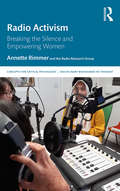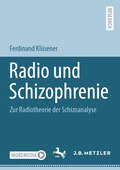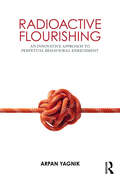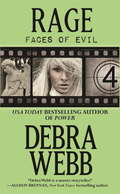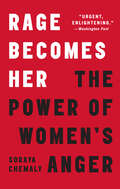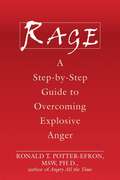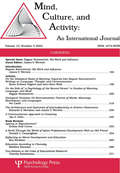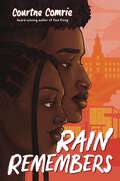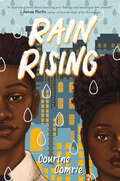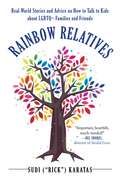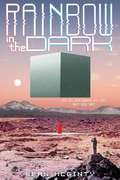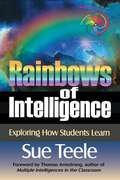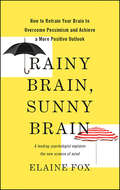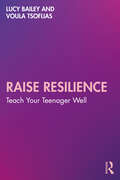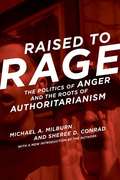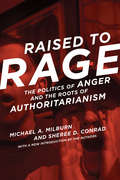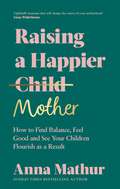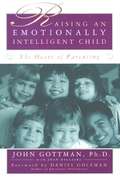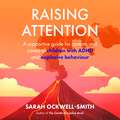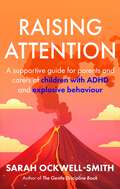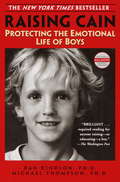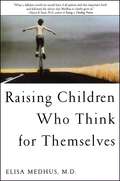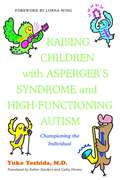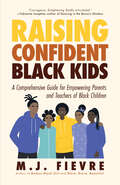- Table View
- List View
Radio Activism: Breaking the Silence and Empowering Women (Concepts for Critical Psychology)
by Annette RimmerThis unique book draws on the narratives of women participants in community radio, using intersectionality, feminist, critical psychological and community development frameworks to explore how this highly symbolic, creative dimension of activism can unmute marginalised women and enrich corporate media. Over a period of four years, twelve female radio project volunteers offer their experiences which they analyse, together as part of the RRG (Radio Research Group), alongside a conceptual and contextual framework to produce insights on the gendered nature of silence, voice and empowerment, and the wider potential of radio activism. Employing literature from a variety of fields, from bell hooks to Stuart Hall, the book foregrounds evidence from the majority world to argue the empowerment potential of community radio and the barriers to radio participation. Through this analysis community radio emerges as a site of development, from which diverse identities transpire through laughter, dialogue, raised consciousness and solidarity, but it also exposes the conflicts of empowerment by recognising inherent tensions in womanhood and in communities. Centering on the global, hegemonic challenge of empowering women, and relevant across multiple disciplines and professions, this is fascinating reading for academics, students and professionals in psychology, gender studies, media studies, development and related areas.
Radio und Schizophrenie: Zur Radiotheorie der Schizoanalyse
by Ferdinand KlüsenerIn diesem Buch wird eine umfassende Radiotheorie der Schizoanalyse formuliert, die auf wenig erforschten Texten, Praktiken und Archivmaterial basiert. Im Mittelpunkt steht die Relevanz der Schizoanalyse für den ästhetischen Diskurs des 20. Jahrhunderts, insbesondere im Kontext der Radiokunst. Der Autor untersucht die Positionierung dieser Theorie zwischen Theater- und Medienwissenschaften und analysiert deren Beziehung zur Geschichte und Ästhetik des Radios. Durch die Verbindung des mikropolitischen Gestenbegriffs von Deleuze und Guattari mit Konzepten des Gestischen aus dem Lehrstück und deren Verortung in einer Phänomenologie der Zeit jenseits des Tragischen wird ein neuer theoretischer Rahmen geschaffen. Zudem werden bisher unbekannte auditive Objekte für die Historisierung und Kanonisierung der Radiotheorie entdeckt. Methodisch stützt sich die Arbeit auf Performanceanalyse, Medienarchäologie und Interviews mit Akteuren des Feldes. Das Buch leistet einen entscheidenden Beitrag zur Erforschung eines weitgehend unerforschten, aber zentral historisch relevanten Themas und definiert neue theoretische Konzepte für Theorie und Praxis.
Radioactive Flourishing: An Innovative Approach to Perpetual Behavioral Enrichment
by Arpan YagnikRadioactive Flourishing is for seekers of lasting happiness and peace. Radioactive Flourishing supplies cognitive insights for eventual behavioral stability. The USP of the book is its flipped human response toward instability. This book’s primary goal is to help people learn ways to flourish individually despite being surrounded by instability.This book is intentionally written in the "katha" style, which means that there are numerous relatable stories and a consistent journey from the core to the periphery, then to the tangent, and back. The implicit and explicit repetition of the key manifest enables the core intervening stimulation to encourage its readers to dig deeper and find solid footing in their flourishing being. This book is for seekers of happiness and peace.This book will be useful to students, researchers, young professionals, and faculty members working in the fields of business administration, psychology, start-ups, finance, entrepreneurship, and communication. It will also be an invaluable resource for aspiring leaders and students of life.
Rage (The Faces of Evil)
by Debra WebbThe fourth novel in Debra Webb's internationally bestselling FACES OF EVIL series, for fans of Karen Rose, Katia Lief and Mary Burton.Danger stalks Jess Harris. Still new to her Deputy Chief position at Birmingham, Alabama's Major Crimes division, she's rebuilding her life after losing everything. But messages from a notorious serial killer continue to haunt her...When the wife of a Birmingham detective is found dismembered in her home with writing streaked across the walls in blood, Jess knows they are up against something truly evil. Is this gang related, a personal vendetta or even more sinister? As two more victims are discovered and evidence points to a shocking suspect, Jess realises the mother's autistic son could hold the key to the killer's identity. But who will protect them now they are next on the hit-list? And will Jess act in time to prevent one final, horrifying act of rage?Catch the rest of the heart-stopping series: Obsession, Impulse, Power, Rage, Revenge and Ruthless.
Rage Becomes Her: The Power of Women's Anger
by Soraya Chemaly***A BEST BOOK OF 2018 SELECTION*** NPR * The Washington Post * Book Riot * Autostraddle * Psychology Today ***A BEST FEMINIST BOOK SELECTION*** Refinery 29, Book Riot, Autostraddle, BITCH Rage Becomes Her is an &“utterly eye opening&” (Bustle) book that gives voice to the causes, expressions, and possibilities of female rage.As women, we&’ve been urged for so long to bottle up our anger, letting it corrode our bodies and minds in ways we don&’t even realize. Yet there are so, so many legitimate reasons for us to feel angry, ranging from blatant, horrifying acts of misogyny to the subtle drip, drip drip of daily sexism that reinforces the absurdly damaging gender norms of our society. In Rage Becomes Her, Soraya Chemaly argues that our anger is not only justified, it is also an active part of the solution. We are so often encouraged to resist our rage or punished for justifiably expressing it, yet how many remarkable achievements would never have gotten off the ground without the kernel of anger that fueled them? Approached with conscious intention, anger is a vital instrument, a radar for injustice and a catalyst for change. On the flip side, the societal and cultural belittlement of our anger is a cunning way of limiting and controlling our power—one we can no longer abide. &“A work of great spirit and verve&” (Time), Rage Becomes Her is a validating, energizing read that will change the way you interact with the world around you.
Rage: A Step-by-Step Guide to Overcoming Explosive Anger (Personal Development)
by Ronald T. Potter-EfronRage can be calmed and controlled with good advice and a practical, effective plan for change. From renowned anger expert Ronald Potter-Efron, this book breaks down rage into four types: In survival rage, anger is triggered by a sense of danger or threat; feelings of helplessness can trigger impotence rage; the third type, abandonment rage, is triggered by a fear of losing a cherished relationship; and shame rage occurs when someone feels very disrespected. Rage briefly discusses how the brain functions during extreme emotion, and then it turns to the task of helping you stop episodes of rage-right now! In classic Potter-Efron style, the book places the responsibility for control squarely on the shoulders of the angry individual. There is no room in this dangerous situation for whys and becauses. Instead, Rage offers no-nonsense, step-by-step anger management tools that really work.
Ragnar Rommetveit: His Work and Influence:a Special Issue of mind, Culture, and Activity
by James V. WertschThis special issue of Mind, Culture, and Activity revisits Rommetveit's ideas in admiration for his quest to understand meaning, language, and mind. It also reflects the inspiration he has provided for those struggling with these issues. Written by those studying Rommetveit and one by Rommetveit himself, all three articles are attempts to spell out, extend, and apply ideas that Rommetveit outlined in his writings at some point early in his career. Rommetveit, however has moved ahead in his struggle to understand the ethical dimensions of communication--including the communication involved in the study of communication--which represents his newest project.
Rain Remembers
by Courtne Comrie"A satisfying, well-written, and authentic sequel highlighting the ways healing and self-love are ongoing processes."—Kirkus Reviews (starred review) In the companion novel to the critically acclaimed Rain Rising, Rain must once again find the strength to rise above.The start of the school year is bringing a lot of changes for Rain: New school. No Circle Group. No Dr. McCalla. No Miss Walia. No step team. And Xander, her older brother and superhero, is away at college.Although everyone else seems okay with change, Rain struggles to open up to her new counselor, her mom, Umi, Alyssa, and even Xander, who seems to have forgotten all about her while away at college. But when an older boy starts giving Rain more attention than she asked for—will she be able to open up again before things go too far?As Kirkus Reviews said of Rain Rising: "A gorgeous debut: a necessary, cathartic, immersive healing experience.” Readers will be eager to follow Rain in this companion novel. Like the rain, she is both gentle and a force, finding strength to rise again.
Rain Rising
by Courtne ComrieAn inspiring debut middle grade novel-in-verse about Rain, who must overcome sadness after her all-star brother is badly beaten up at a frat party. Genesis Begins Again meets Brown Girl Dreaming in this powerful story of perseverance, family, and hope.“A captivating novel about honoring your feelings and learning to love yourself.” —Janae Marks, author of From the Desk of Zoe Washington“A powerful novel about mental health, self-love, and family. Filled with tenderness and heart.” —Mariama J. Lockington, author of For Black Girls Like Me and In the Key of Us Rain is keeping a big secret from everyone around her: She's sad. All the time. Rain struggles with her image and feels inferior to her best friend, Nara. Not even her all-star student-athlete big brother (and personal superhero), Xander, can help Rain with her dark thoughts and low self-esteem.And when Xander becomes the victim of violence at a predominantly white university, Rain’s life and mind take a turn for the worse. But when her favorite teacher, Miss Walia, invites her to an after-school circle group, Rain finds the courage to help herself and her family heal.Like the rain, she is both gentle and a force, finding strength to rise again.“You can't help but fall in love with this book. Heartbreaking, emotional, and a ride well worth taking.” —Marie Arnold, author of The Year I Flew Away and I Rise“Everyone who reads this will be inspired by Rain's dedication to finding healing.” —Elisabet Velasquez, author of When We Make It
Rainbow Relatives: Real-World Stories and Advice on How to Talk to Kids About LGBTQ+ Families and Friends
by Sudi Rick" KaratasWhether you have your own questions because you’re preparing to come out to your kids, or you aren’t sure how to explain to your kids why their uncle has a boyfriend or why their friend has two mommies, this book can help. With an entertaining and educational approach to educating yourself and your peers about the issues and topics surrounding the LGBTQ+ community, Rainbow Relatives will provide answers to your kids’ questions and help you raise them to be open-minded and accepting adults.First and foremost, this book will help you approach the conversations you need to have and predict what you can expect from them. Author Sudi Karatas tells a variety of stories, such as that of a Mormon woman’s transition from fighting against gay rights to becoming a crusader for them. Also included are the voices of filmmakers, actors, musicians, mental health professionals, and more. Through Rainbow Relatives, Karatas helps parents support, advocate for, and educate their children, relatives, and family friends.
Rainbow in the Dark
by Sean McGintyThe Wizard of Oz meets Ready Player One in this darkly comic YA novel about identity, depression, giving up, and finding your way home.High school senior Rainbow is trapped with three other teens in a game-like world that may or may not be real. Together, they must complete quests and gain experience in order to access their own forgotten memories, decode what has happened to them, and find a portal home. As Rainbow&’s memories slowly return, the story of a lonely teen facing senior year as the new kid in a small town emerges. Surreal, absurdist humor balances sensitively handled themes of suicide, depression, and the search for identity in an unpredictable and ultimately hopeful page-turner that's perfect for fans of Shaun David Hutchinson, Adam Silvera, and Libba Bray's Going Bovine.
Rainbows of Intelligence: Exploring How Students Learn
by Sue TeeleThis book explores the multiple ways students process information and examines multiple intelligences through the relationship between rainbows, colors, and how individuals learn. If we consider the full range of human potential as the spectrum of the rainbow, then each individual is unique and has the potential to develop all of the intelligences using different areas of the brain. The author has included several lesson plans that can be adapted for students of any age, and has written them to meet U. S. and California standards. This book will be a valuable resource for educators and administrators, school boards, and parents.
Rainy Brain, Sunny Brain: How to Retrain Your Brain to Overcome Pessimism and Achieve a More Positive Outlook
by Elaine FoxAre you optimistic or pessimistic? Glass half-full or half-empty? Do you look on the bright side or turn towards the dark? These are easy questions for most of us to answer, because our personality types are hard-wired into our brains. As pioneering psychologist and neuroscientist Elaine Fox has discovered, our outlook on life reflects our primal inclination to seek pleasure or avoid danger-inclinations that, in many people, are healthily balanced. But when our “fear brain” or “pleasure brain” is too strong, the results can be disastrous, as those of us suffering from debilitating shyness, addiction, depression, or anxiety know all too well. Luckily, anyone suffering from these afflictions has reason to hope. Stunning breakthroughs in neuroscience show that our brains are more malleable than we ever imagined. InRainy Brain, Sunny Brain, Fox describes a range of techniques-from traditional cognitive behavioral therapy to innovative cognitive-retraining exercises-that can actually alter our brains’ circuitry, strengthening specific thought processes by exercising the neural systems that control them. The implications are enormous: lifelong pessimists can train themselves to think positively and find happiness, while pleasure-seekers inclined toward risky or destructive behavior can take control of their lives. Drawing on her own cutting-edge research, Fox shows how we can retrain our brains to brighten our lives and learn to flourish. With keen insights into how genes, life experiences and cognitive processes interleave together to make us who we are,Rainy Brain, SunnyBrainrevolutionizes our basic concept of individuality. We learn that we can influence our own personalities, and that our lives are only as “sunny” or as “rainy” as we allow them to be.
Raise Resilience: Teach Your Teenager Well
by Lucy Bailey Voula TsofliasThis practical self-help guide introduces “Psychological Fitness” – a powerful combination of mental resilience and emotional well-being that can transform how your child navigates life’s challenges. It provides brain training methods that parents and teachers can adopt and use to foster skills and knowledge in children and young people, so they can successfully navigate this uncertain and ever-changing world.Sharing simple, proven techniques developed over two decades of successful programs with children and young people, you will find easy-to-implement tools that will help them express their worries and build their own solutions, alongside effective brain training methods that promote both mental and physical health. These will empower you to help your teenagers embrace their unique identity and develop crucial life skills. Through practical exercises, they will build a foundation of resilient thinking, emotional awareness, optimism, and empathy – essential abilities that support their well-being now and throughout adulthood.Whether you’re a parent or work with children professionally, this straightforward guide offers life-changing opportunities to support the young people in your care. The refreshingly simple techniques can be implemented right away, creating lasting positive impacts on mental and emotional health.
Raised to Rage: The Politics of Anger and the Roots of Authoritarianism
by Michael A. Milburn Sheree D. ConradPoliticians routinely amplify and misdirect voters' anger and resentment to win their support. Opportunistic candidates encourage supporters to direct their anger toward Mexicans, Muslims, women, protestors, and others, rather than the true socioeconomic causes of their discontent. This book offers a compelling and novel explanation for political anger and the roots of authoritarian political attitudes. In Raised to Rage, Michael Milburn and Sheree Conrad connect vociferous opposition to immigrants, welfare, and abortion to the displacement of anger, fear, and helplessness. These emotions may be triggered by real economic and social instability, but Milburn and Conrad's research shows that the original source is in childhood brutalization or some other emotional trauma. Their research also shows that frequent experiences of physical punishment in childhood increase support in adulthood for punitive public policies, distorting the political process. Originally published in 1996, reprinted now with a new introduction by the authors that updates the empirical evidence and connects it to the current political situation, this book offers a timely consideration of a paradox in American politics: why voters are convinced by campaign rhetoric, exaggeration, and scapegoating to vote against their own interests.
Raised to Rage: The Politics of Anger and the Roots of Authoritarianism (The\mit Press Ser.)
by Michael A. Milburn Sheree D. ConradAn argument that voter anger and authoritarian political attitudes can be traced to the displacement of anger, fear, and helplessness.Politicians routinely amplify and misdirect voters' anger and resentment to win their support. Opportunistic candidates encourage supporters to direct their anger toward Mexicans, Muslims, women, protestors, and others, rather than the true socioeconomic causes of their discontent. This book offers a compelling and novel explanation for political anger and the roots of authoritarian political attitudes. In Raised to Rage, Michael Milburn and Sheree Conrad connect vociferous opposition to immigrants, welfare, and abortion to the displacement of anger, fear, and helplessness. These emotions may be triggered by real economic and social instability, but Milburn and Conrad's research shows that the original source is in childhood brutalization or some other emotional trauma. Their research also shows that frequent experiences of physical punishment in childhood increase support in adulthood for punitive public policies, distorting the political process. Originally published in 1996, reprinted now with a new introduction by the authors that updates the empirical evidence and connects it to the current political situation, this book offers a timely consideration of a paradox in American politics: why voters are convinced by campaign rhetoric, exaggeration, and scapegoating to vote against their own interests.
Raising A Happier Mother: The empowering guide to motherhood and must-read book for any new mum
by Anna MathurTHE PERFECT, THOUGHTFUL GIFT FOR THE MUM IN YOUR LIFE!This isn't a parenting book.This isn't a guide to being a perfect parent (spoiler: they don't exist)This is a book about you.We can only anchor, nurture, nourish and instill confidence in our children when we extend the same support to ourselves. After all, how can we effectively tend to our children's needs when our energy reserves are depleted? How can we lead by example and teach our children the importance of healthy self-esteem if we are struggling with these things ourselves? There are a thousand and one ways to parent, and only one way that's authentic for you.Drawing on her work as a psychotherapist, alongside her own experiences as a mother, Anna shows that caring with our children begins with caring for ourselves, and it's time to replace exhaustion with empowerment. Far from being selfish, self-care is an essential quality of a happier mother good parent. The greatest gift you can give to to yourself and your children, is to give yourself permission to thrive.
Raising An Emotionally Intelligent Child: The Heart Of Parenting
by John GottmanIntelligence That Comes from the HeartEvery parent knows the importance of equipping children with the intellectual skills they need to succeed in school and life. But children also need to master their emotions. Raising an Emotionally Intelligent Child is a guide to teaching children to understand and regulate their emotional world. And as acclaimed psychologist and researcher John Gottman shows, once they master this important life skill, emotionally intelligent children will enjoy increased self-confidence, greater physical health, better performance in school, and healthier social relationships. Raising an Emotionally Intelligent Child will equip parents with a five-step "emotion coaching" process that teaches how to:* Be aware of a child's emotions* Recognize emotional expression as an opportunity for intimacy and teaching* Listen empathetically and validate a child's feelings* Label emotions in words a child can understand* Help a child come up with an appropriate way to solve a problem or deal with an upsetting issue or situationWritten for parents of children of all ages, Raising an Emotionally Intelligent Child will enrich the bonds between parent and child and contribute immeasurably to the development of a generation of emotionally healthy adults.
Raising Attention: A supportive guide for parents and carers of children with ADHD and explosive behaviour
by Sarah Ockwell-SmithA book for anybody who has, or works with, children (of any age) with 'out of control' behaviour, including parents, teachers and healthcare professionals. Raising Attention busts commonly believed myths surrounding ADHD and 'naughty' children, discusses up to date neuroscience and genetics research in an accessible way and provides practical tips that really make a difference to both children and the adults who care for them.Written by bestselling childcare expert Sarah Ockwell-Smith, herself a mother of a young adult with ADHD, there are plenty of heartwarming and heartbreaking personal stories included to bring the book to life.If you've ever felt exhausted, helpless, guilty, embarrassed or shamed for your child's behaviour, this supportive and non-judgemental book is for you.
Raising Attention: A supportive guide for parents and carers of children with ADHD and explosive behaviour
by Sarah Ockwell-SmithA book for anybody who has, or works with, children (of any age) with 'out of control' behaviour, including parents, teachers and healthcare professionals. Raising Attention busts commonly believed myths surrounding ADHD and 'naughty' children, discusses up to date neuroscience and genetics research in an accessible way and provides practical tips that really make a difference to both children and the adults who care for them.Written by bestselling childcare expert Sarah Ockwell-Smith, herself a mother of a young adult with ADHD, there are plenty of heartwarming and heartbreaking personal stories included to bring the book to life.If you've ever felt exhausted, helpless, guilty, embarrassed or shamed for your child's behaviour, this supportive and non-judgemental book is for you.
Raising Attention: A supportive guide for parents and carers of children with ADHD and explosive behaviour
by Sarah Ockwell-SmithA book for anybody who has, or works with, children (of any age) with 'out of control' behaviour, including parents, teachers and healthcare professionals. Raising Attention busts commonly believed myths surrounding ADHD and 'naughty' children, discusses up to date neuroscience and genetics research in an accessible way and provides practical tips that really make a difference to both children and the adults who care for them.Written by bestselling childcare expert Sarah Ockwell-Smith, herself a mother of a young adult with ADHD, there are plenty of heartwarming and heartbreaking personal stories included to bring the book to life.If you've ever felt exhausted, helpless, guilty, embarrassed or shamed for your child's behaviour, this supportive and non-judgemental book is for you.
Raising Cain: Protecting the Emotional Life of Boys
by Michael Thompson Dan KindlonThe stunning success of Reviving Ophelia, Mary Pipher's landmark book, showed a true and pressing need to address the emotional lives of girls. Now, finally, here is the book that answers our equally timely and critical need to understand our boys.In Raising Cain, Dan Kindlon, Ph.D., and Michael Thompson, Ph.D., two of the country's leading child psychologists, share what they have learned in more than thirty-five years of combined experience working with boys and their families. They reveal a nation of boys who are hurting--sad, afraid, angry, and silent. Statistics point to an alarming number of young boys at high risk for suicide, alcohol and drug abuse, violence and loneliness. Kindlon and Thompson set out to answer this basic, crucial question: What do boys need that they're not getting? They illuminate the forces that threaten our boys, teaching them to believe that "cool" equals macho strength and stoicism. Cutting through outdated theories of "mother blame," "boy biology," and "testosterone," Kindlon and Thompson shed light on the destructive emotional training our boys receive--the emotional miseducation of boys.Through moving case studies and cutting-edge research, Raising Cain paints a portrait of boys systematically steered away from their emotional lives by adults and the peer "culture of cruelty"--boys who receive little encouragement to develop qualities such as compassion, sensitivity, and warmth. The good news is that this doesn't have to happen. There is much we can do to prevent it. Kindlon and Thompson make a compelling case that emotional literacy is the most valuable gift we can offer our sons, urging parents to recognize the price boys pay when we hold them to an impossible standard of manhood. They identify the social and emotional challenges that boys encounter in school and show how parents can help boys cultivate emotional awareness and empathy--giving them the vital connections and support they need to navigate the social pressures of youth.Powerfully written and deeply felt, Raising Cain will forever change the way we see our sons and will transform the way we help them to become happy and fulfilled young men.From the Hardcover edition.
Raising Children Who Think for Themselves
by Elisa MedhusHow many of us liken parenthood to a perilous journey? As parents, we are constantly teaching our children to fend off outer evils like drugs, alcohol, gangs, violence, and suicide, as well as helping them sidestep inner pitfalls like cynicism, eating disorders, irresponsibility, and poor impulse control. These dilemmas can sometimes make our children's future appear downright bleak! In spite of all this, our job is to raise them to be successful, competent, self-confident, and independent.
Raising Children with Asperger's Syndrome and High-functioning Autism: Championing the Individual
by Lorna Wing Yuko YoshidaIf you have a child with Asperger's syndrome (AS) or high-functioning autism, conventional parenting principles will often prove insufficient and unproductive. This intelligent companion has all the answers, explanations and advice to enable parents to feel confident in providing effective support for their child with AS or high-functioning autism. The author explains how to help develop social and communication skills, clarifies the type of assistance needed from outside the family (and where to find it), and includes suggestions on how to ensure that the needs of other siblings are also met. Written from the insightful perspective of a child psychiatrist, this very practical book will provide concrete help for parents and carers. The experience and expertise shared will also be useful for all professionals working with children with AS or high-functioning autism and their families.
Raising Confident Black Kids: A Comprehensive Guide for Empowering Parents and Teachers of Black Children
by MJ FievreHow to Raise Black Kids in a Racist World#1 New Release in Teacher Resources and Student LifeRaising Confident Black Kids includes everything Black and multi-racial families need to know to raise empowered, confident children. From the realities of living while Black to age-appropriate ways to discuss racism with your children, educator M.J. Fievre provides a much-needed resource for parents of Black kids everywhere.It’s hard to balance protecting your child’s innocence with preparing them for the realities of Black life. When —and how —do you approach racism with your children? How do you protect their physical and mental health while also preparing them for a country full of systemic racism? On the heels of Why Are All the Black Kids Sitting Together in the Cafeteria and “Multiplication Is for White People” comes a parenting book specifically for parents of Black kids.Now, there’s a guide to help you teach your kids how to thrive —even when it feels like the world is against them. From racial profiling and police encounters to the whitewashed lessons of history taught in schools, raising Black kids is no easy feat. In Raising Confident Black Kids, teacher M.J. Fievre passes on the tips and guidance that have helped her educate her Black students, including:How to encourage creativity and build self-confidence in your kidsWays to engage in activism and help build a safer community with and for your children —and ways to rest when you need toHow to explain systemic racism, intersectionality, and micro-aggressionsIf you found guidance and inspiration from books like The Unapologetic Guide to Black Mental Health, Mother to Son, or Breathe, you’ll love Raising Confident Black Kids.
